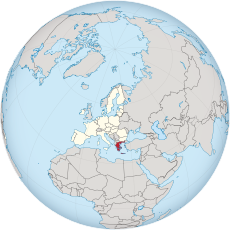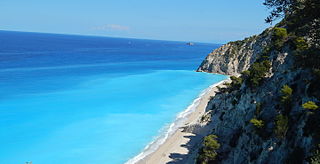Contents

This page list topics related to Greece.

This page list topics related to Greece.
| | This section is empty. You can help by adding to it. (July 2010) |
| | This section is empty. You can help by adding to it. (July 2010) |

Tourism in Greece has been a key element of the economic activity in the country, and is one of the country's most important sectors. Greece has been a major tourist destination and attraction in Europe since the 1970s for its rich culture and history, which is reflected in large part by its 18 UNESCO World Heritage Sites, among the most in Europe and the world as well as for its long coastline, many islands, and beaches.
Neapoli or Neapolis may refer to:

The 2004 Summer Olympics Torch Relay took the Olympic Flame across every habitable continent, returning to Athens, Greece. Every city which had hosted, will host, or coincidentally elected to host the Summer Olympics, the Winter Olympics and the Youth Olympics was revisited by the torch, as well as several other cities chosen for their international importance. The main reason why the torch relay went around the world was to highlight the fact that the Olympic Games were started in Greece and in modern times have been held around the world and then took place in Greece in 2004.

Greek art began in the Cycladic and Minoan civilization, and gave birth to Western classical art in the subsequent Geometric, Archaic and Classical periods. It absorbed influences of Eastern civilizations, of Roman art and its patrons, and the new religion of Orthodox Christianity in the Byzantine era and absorbed Italian and European ideas during the period of Romanticism, until the Modernist and Postmodernist. Greek art is mainly five forms: architecture, sculpture, painting, pottery and jewelry making.

The provinces of Greece were sub-divisions of some the country's prefectures. From 1887, the provinces were abolished as actual administrative units, but were retained for some state services, especially financial and educational services, as well as for electoral purposes. Before the Second World War, there were 139 provinces, and after the war, with the addition of the Dodecanese Islands, their number grew to 147. According to the Article 7 of the Code of Prefectural Self-Government, the provinces constituted a "particular administrative district" within the wider "administrative district" of the prefectures. The provinces were finally abolished after the 2006 local elections, in line with Law 2539/1997, as part of the wide-ranging administrative reform known as the "Kapodistrias Project", and replaced by enlarged municipalities (demoi).
Greek vehicle registration plates are composed of three letters and four digits per plate printed in black on a white background. The letters represent the district (prefecture) that issues the plates while the numbers range from 1000 to 9999. As of 2004 a blue strip was added on the left showing the country code of Greece (GR) in white text and the Flag of Europe in yellow. Similar plates but of square size with numbers ranging from 1 to 999 are issued for motorcycles which exceed 50 cc in engine size.

Astakos is a town and a former municipality in Aetolia-Acarnania, West Greece, Greece. Since the 2011 local government reform it is part of the municipality Xiromero, of which it is a municipal unit. The municipal unit has an area of 345.099 km2. It is located on a bay on the eastern shore of the Ionian Sea, near the southern end of the Acarnanian Mountains. It takes its name from the ancient Acarnanian town Astacus, and was named Dragamesti in the Middle Ages. It is speculated to be the site of ancient Dulichium.
Kallithea may refer to:
Agia Paraskevi is a suburb of Athens, Greece. It may also refer to:

Agios Nikolaos, Hagios Nikolaos or Aghios Nikolaos is a coastal city on the Greek island of Crete, lying east of the island's capital Heraklion, north of the city of Ierapetra and west of the city of Sitia.
Agios Dimitrios may refer to:
Kryoneri may refer to numerous settlements in Greece:

The regions of ancient Greece were areas identified by the ancient Greeks as geographical sub-divisions of the Hellenic world. These regions are described in the works of ancient historians and geographers, and in the legends and myths of the ancient Greeks.
Digea is a Greek network operator that provides a digital terrestrial television system in Greece for seven nationwide free-to-air channels. In addition to these free-to-air nationwide stations, the network is open to any other station choosing to use its services.
In Greece, ephor is a title given to the head of an archaeological ephorate, or archaeological unit. Ephors are responsible to the Ministry of Culture and Sports.